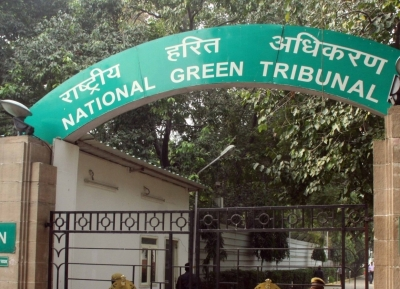NGT takes suo motu cognizance of report linking well water to brain-eating amoeba cases
By IANS | Updated: September 5, 2025 18:00 IST2025-09-05T17:55:07+5:302025-09-05T18:00:05+5:30
New Delhi, Sep 5 The National Green Tribunal (NGT) has taken suo motu cognisance of a media report ...

NGT takes suo motu cognizance of report linking well water to brain-eating amoeba cases
New Delhi, Sep 5 The National Green Tribunal (NGT) has taken suo motu cognisance of a media report that suggested well water could be a potential source of brain-eating amoeba cases in Kerala’s Kozhikode district.
Primary Amoebic Meningoencephalitis (PAM), a rare and deadly brain infection, is caused by Naegleria fowleri, commonly known as the brain-eating amoeba.
A bench led by Chairperson Justice Prakash Shrivastava registered an original application suo moto (on its own motion) following a news item titled ‘Well water could be source of infection for PAM cases: officials’.
Referring to the news report, the Bench, also comprising expert members Dr A. Senthil Vel, Sudhir Kumar Chaturvedi, and Dr Sujit Kumar Bajpayee, noted that three persons, including a three-month-old infant and an 11-year-old girl, are currently undergoing treatment for the infection. While the infant remains critical, the media report highlighted that a nine-year-old child had earlier succumbed to the disease, and two of her siblings are under medical observation with fever-like symptoms.
Health officials, the report stated, detected the presence of the brain-eating amoeba in the well water of the three-month-old’s house. This discovery has led to suspicions that well water, in addition to pond water, could be a significant contributing factor in the spread of the infection.
Officials suspect that the organisms may have entered the child’s body during bathing.
The green tribunal observed that the matter indicated potential violations of the Environment (Protection) Act, 1986 and the Water (Prevention and Control of Pollution) Act, 1974.
Impleading the Kerala State Pollution Control Board, Central Pollution Control Board (CPCB), Directorate of Health Services, Kerala, and the District Collector, Kozhikode, as respondents, the NGT directed them to file their responses by way of affidavit before the Southern Zonal Bench, Chennai.
“Let notice be issued to the respondents… If any respondent directly files the reply without routing it through their advocate, then the said respondent will remain virtually present to assist the Tribunal,” the order stated. The NGT’s Southern Zonal Bench in Chennai will hear the case next on October 9.
Disclaimer: This post has been auto-published from an agency feed without any modifications to the text and has not been reviewed by an editor
Open in app